Iran Will Retaliate Against Any Further Israeli ‘Mischief’
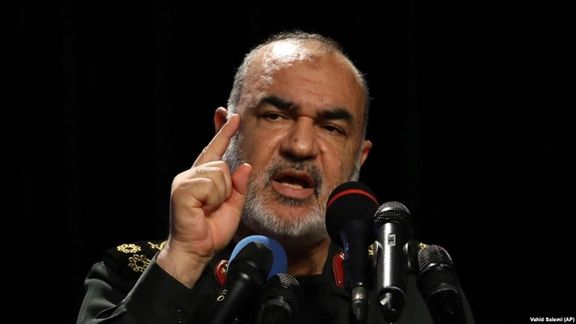
Israel should forsake “mischief” against Iran or face “revenge,” Hossein Salami, commander of Iran’s Revolutionary Guards told a memorial gathering Wednesday.

Israel should forsake “mischief” against Iran or face “revenge,” Hossein Salami, commander of Iran’s Revolutionary Guards told a memorial gathering Wednesday.
“We do not just hold funeral services for our martyrs - we also take revenge,” Salami told a memorial service for a veteran IRGC officer, Mohammad-Hassan Kusehchi, a Dezful native, who died of illness in March 2021. “These are real and serious messages.”
Major-General Salami described the new century, in the Iranian calendar, as a period of decline for the West: “The end of America and western civilization began many years ago. In addition, the revolutionary movement has continued and accelerated in recent years.”
While Israeli attacks go back to killing nuclear scientists from 2010 to 2020, and include June 2021’s attack on a nuclear facility at Karaj, there has been a recent escalation. In February, an Israeli aerial strike reportedly destroyed hundreds of drones at an airbase in Kermanshah province, and March 7 an Israeli airstrike near Damascus killed two Iranian officers in the latest of hundreds of Israeli airstrikes on Iranian forces in Syria since 2017.
The apparent response was Tehran's recent missile attack on Iraq’s Erbil, where Iran fired 12 ballistic missiles saying it targeted an Israeli secret base. Some Iran-backed sources said the Erbil attack killed several people but according to Iraqi officials no one was killed.
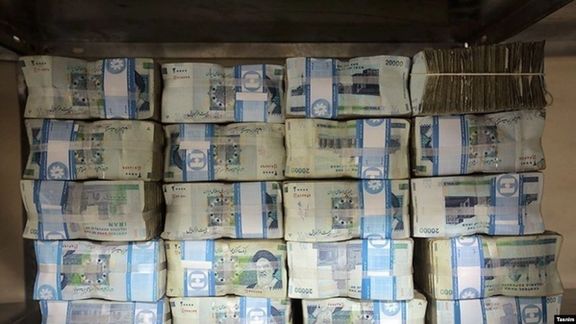
Iran’s annual inflation rate topped 40 percent in the past 12 months, the highest since 1996 when it reached 50 percent, according to Iran Statistical Center.
The figures show food prices rising much faster than the general inflation rate, reaching 51.5 percent from March 21, 2021, to March 20, 2022 – the period covering the Iranian calendar year 1400 which ended on Sunday.
In recent months, official reports were saying that food prices were rising by more than 60 percent, but Statistical Center, a government entity put the final annual report just above 50 percent. Government officials had also warned that poverty was rising and many middle-class families’ purchasing power dropped to the “poverty line.”
Labor unions have insisted that a family of 3.3 persons needs a monthly income of around $450 to afford basic necessities and avoid being categorized as ‘poor’, but average salaries for wage earners were between $100-150 throughout the year. Recently, government and labor representatives agreed to raise the minimum salary that most workers receive, to a little over $200 a month, which is still well below the $450 cited as the minimum need of a small family.
Private sector businessmen, however, have warned that the nearly 45-percent rise in the minimum wage will simply make inflation worse in the absence of strong economic growth.
The Iranian Labour News Agency ILNA published an interview with a member of Iran’s Chamber of Commerce, Khosrow Forughan on Tuesday, who said the inflation rate is bound to continue or get worse. The government has eliminated subsidies for food and animal feed and has raised natural gas prices for some customers, he said. He also cited a large government budget deficit as more reason for inflation to remain high.
The average economic growth rate in the past decade has been zero, affected by international and United States sanctions. But growth has been weak throughout the 43-year history of the Islamic Republic averaging about 2.5 percent, while developing countries need much higher growth to expand their economies. Still, what was achieved was mainly due to crude oil exports.
Consecutive governments have resorted to printing money to deal with sanctions and slow growth, expanding liquidity by eightfold since 2013. This is the immediate cause of high inflation.
Gholam-Hassan Netaj, a banking expert told Alef news website on Wednesday that existing high liquidity is beyond the tolerance level of the economy, leading to inflation, and creating a vicious circle of printing more money. Banks are unable to collect loans from commercial customers and they turn to the Central Bank of Iran (CBI) to borrow more money. The government also forces banks, mostly owned by state entities, to provide financing to quasi-state inefficient companies, forcing CBI to print money.
Netaj also underlined that a policy of forcing banks to provide loans for increasing industrial production will backfire because it would add to liquidity. Iran’s Supreme Leader Ali Khamenei has been urging banks to target their loans to encourage production. Netaj said that as long as the country faces high liquidity, targeted loans will not be effective.
Although Iran’s parliament is politically aligned with the presidential administration of Ebrahim Raisi, it has strongly signaled its unhappiness with several ministers. Lawmakers who were elected two years ago in a low-turnout election have to face constituents and have no answers for high inflation.
A senior member of parliament, Hossein-Ali Haji-Daligani was quoted by Etemad Online website on Wednesday as saying, “When people meet us and ask why the price of rice has doubled, we have no answers.”
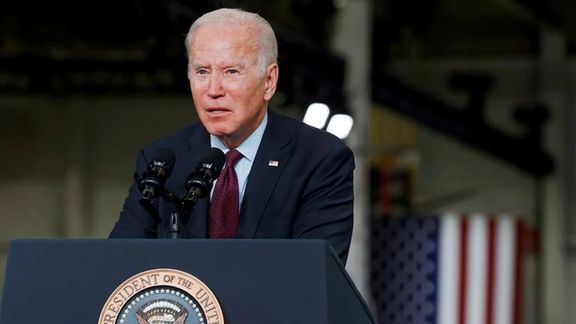
Pressure is growing on the Biden Administration to walk away from Vienna talks after reports that Iran's IRGC may be removed from the US terror designation.
Opponents of the restoration of the 2015 nuclear agreement, Joint Comprehensive Plan of Action (JCPOA), believe that restoring the JCPOA at the cost of delisting the IRGC without curbing Iran's ballistic missile program is too high a price for the United States to pay to bring Iran back to compliance with the deal.
In a statement Tuesday after a briefing with from the State Department’s main JCPOA negotiator Rob Malley, Senior Republican Senator Jim Risch called the reports out of Vienna "unsettling at best" and strongly criticized the Biden administration for pursuing a deal with Iran despite objections from US partners in the Middle East and urged the administration to walk away from the talks.
“A deal that provides $90-$130 billion in sanctions relief, relieves sanctions against Iran’s worst terror and human rights offenders, and delists the IRGC does not support our national security interests. Worse, this deal could enable Putin to continue to build out his nuclear arsenal and benefit financially in the midst of his assault against Ukraine. The administration should walk away,” he said in his statement.
Eighty-six Republican Representatives have signed a letter to Secretary of State Antony Blinken to express their opposition to the Biden administration's possible move to delist the IRGC. "We are united in strong opposition to any move to legitimize the IRGC's reckless, destabilizing, and anti-Semitic actions throughout the Middle East," the letter says.
"The President is the guy who’s managed to lose two sovereign nations in 6 months: The Afghanistan debacle and Ukraine, and now he's out there to find ways to enable Iran," Republican Senator Josh Hawley told Iran International correspondent in Washington on Tuesday.
Democratic Senator Tim Kaine, however, believes relations with Iran could become normal. "If we have arrangements [with Iran] that force us to communicate, we could expect trust to be rebuilt & eventually get to normalcy. There's nothing unrealistic about it: Japan & Germany are among our closest allies, but we were at war with them," he told Iran International.
The Senate Democratic Party whip Dick Durbin also cautiously defended the administration. He told Iran International’s correspondent Arash Aalaei on Monday that “the premise” of reviving the 2015 deal, the JCPOA (Joint Comprehensive Plan of Actions) was “sound to stop Iran from becoming a nuclear power.” This, Durbin said was “obviously in the best interests of regional and world peace.”
Answering a question about the concerns of other regional states, particularly Israel, which is believed to have nuclear weapons, Durbin reiterated that peace required “a credible, enforceable plan to stop Iran from developing nuclear weapons,” which he said would be a “threat to every nation in the region…including Israel.”
"The onus is on Tehran to make difficult decisions that it might consider difficult, but we have negotiated for the better part of a year – of course, indirectly through our allies and partners – in good faith in a constructive manner to get us to this point. We are still at a point where if those decisions are made, we could reach a mutual return to compliance very soon, but it will take some decisions," the State Department Spokesman Ned Price said at his daily briefing Tuesday.
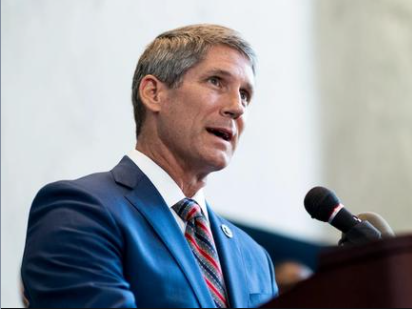
More Republican lawmakers have raised objections to removing Iran’s Revolutionary Guards (IRGC) from the US list of foreign terrorist organizations (FTO).
Representative Scott Franklin – who spearheaded a letter expressing opposition to the Biden administration’s possible move – reiterated on Tuesday that the IRGC is a chief sponsor of terrorism in the world today.
In the letter, Franklin and 86 of his colleagues urged Secretary of State Antony Blinken not to remove the IRGC from the list, saying the IRGC "is one of the most dangerous terrorist groups in the world today. Through its sponsorship of terrorism, the IRGC is responsible for the deaths of countless innocent people and at least 600 US troops during the occupation of Iraq”.
They said they are deeply concerned about reports that the administration intends to remove the IRGC terrorist designation “within the confines of a new Iran Nuclear Deal”, adding “We are united in strong opposition to any move to legitimize the IRGC’s reckless, destabilizing, and anti-Semitic actions throughout the Middle East”.
Israel’s prime minister and foreign minister have called on Washington to keep IRGC on the list, saying the IRGC is "a terrorist organization that has murdered thousands of people, including Americans”.
Iranian officials have been publicly raising the issue since at least November, saying a ‘good deal’ would mean lifting sanctions on the Revolutionary Guard.
Such a step would reverse former President Donald Trump's 2019 blacklisting of the group, the first time the US had formally labeled part of another sovereign government as a terrorist group.
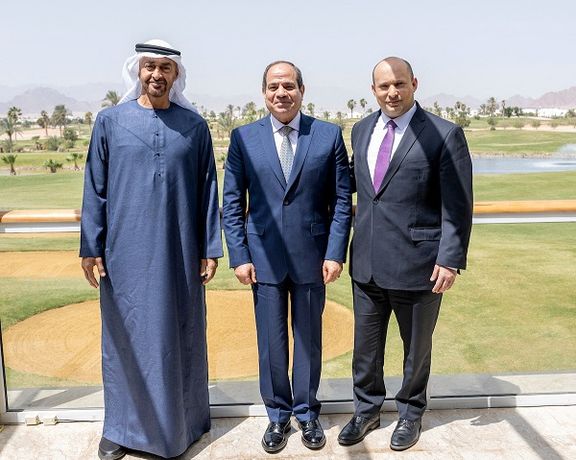
The US State Department has welcomed the trilateral summit on Tuesday between the leaders of Egypt, Israel and the United Arab Emirates, partly focused on Iran.
Leaders of the three counties met in Sharm el-Sheikh for talks on the economic impact of Russia's invasion of Ukraine and the growing influence of Iran in the region.
State Department spokesperson Ned Price told reporters in his daily briefing that Washington will continue to support. the Abraham Accords.
The three counties, in addition to Saudi Arabia, are concerned about the Biden Administration’s attempts to reach a new deal with Iran to revive the 2015 nuclear agreement known as JCPOA. Israeli officials in particular have indicated that Washington is not fully responsive to their concerns about Iran’s nuclear program and regional ambitions.
Price tried to implicitly address these concerns, saying that US Special Envoy for Iran Robert Malley has been in close consultations with Persian Gulf Arab partners. The spokesman tried to argue that Washington’s Arab allies welcome its diplomatic efforts to revive the JCPOA.
But the trilateral meeting between Egypt, Israel and the UAE is seen as a regional effort to create a united front against Iran, whether the JCPOA is revived or not.
He also underscored President Joe Biden’s commitment to prevent Iran from ever acquiring nuclear weapons.
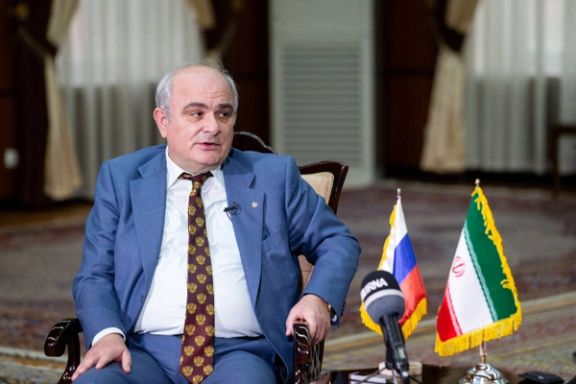
A tweet by the Russian embassy in Tehran in reaction to US President Joe Biden’s congratulatory message for Noruz (Nowruz) has led to controversy.
Khabar Online, a leading news website in Tehran, ran an article about a tweet by the Russian embassy on Tuesday, calling it an epitome of “interference in the diplomatic affairs of the host country by ambassadors”.
Describing it as a violation of international norms and protocols, the article echoed similar sentiments by many Iranian social media users who urged an official reaction by the Iranian foreign ministry.
Reacting to Biden’s message, the Russian embassy described it as hypocritical that Washington imposes sanction on the Islamic Republic but congratulates the Noruz.
“Those who for a long time have been imposing illegal unilateral sanctions against Iran and exerting economic pressure on this country cynically congratulate on Nowruz”, the post said, adding that “We consider this the height of hypocrisy!”
However, President Biden – as well as Secretary of State Antony Blinken -- made no mention of Iran or the aspirations of Iranians in their Noruz messages, unlike their predecessors.
“Jill and I want to extend our best wishes to all who are celebrating Nowruz around the world. The Nowruz holiday means gathering at the Nowruz table to give thanks for loved ones, reflect on your blessings, and welcome all the possibilities of a new season”, read the message.
In recent weeks Russia’s prominent role in the Vienna nuclear negotiations has led to controversy in Iran, as many have said Moscow is using the talks to secure its own interests.